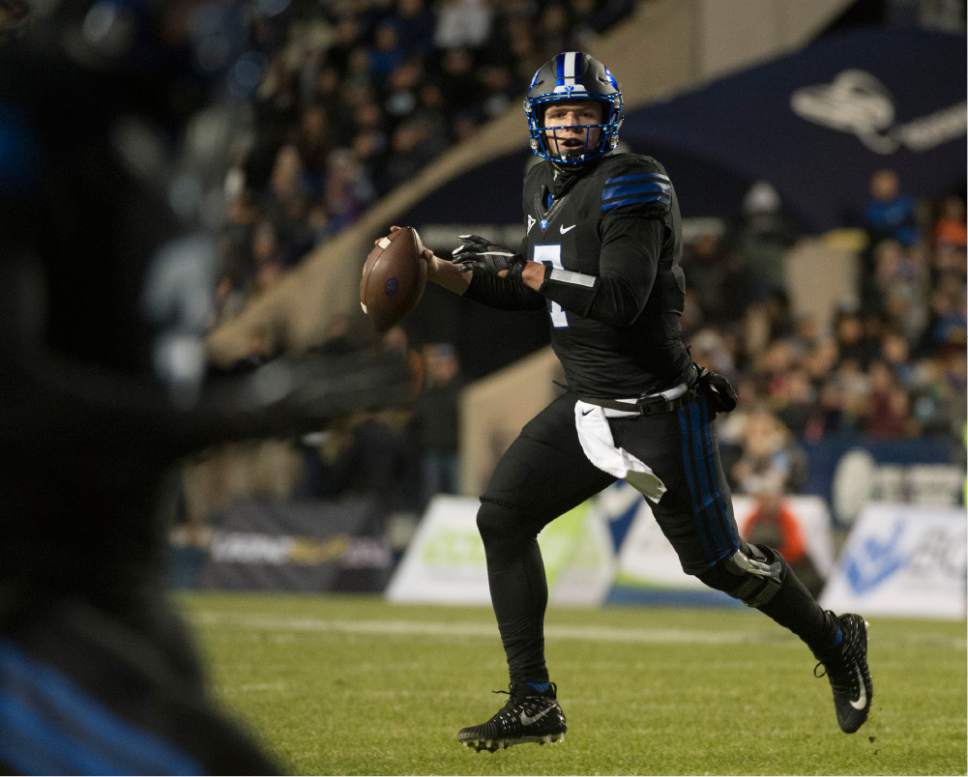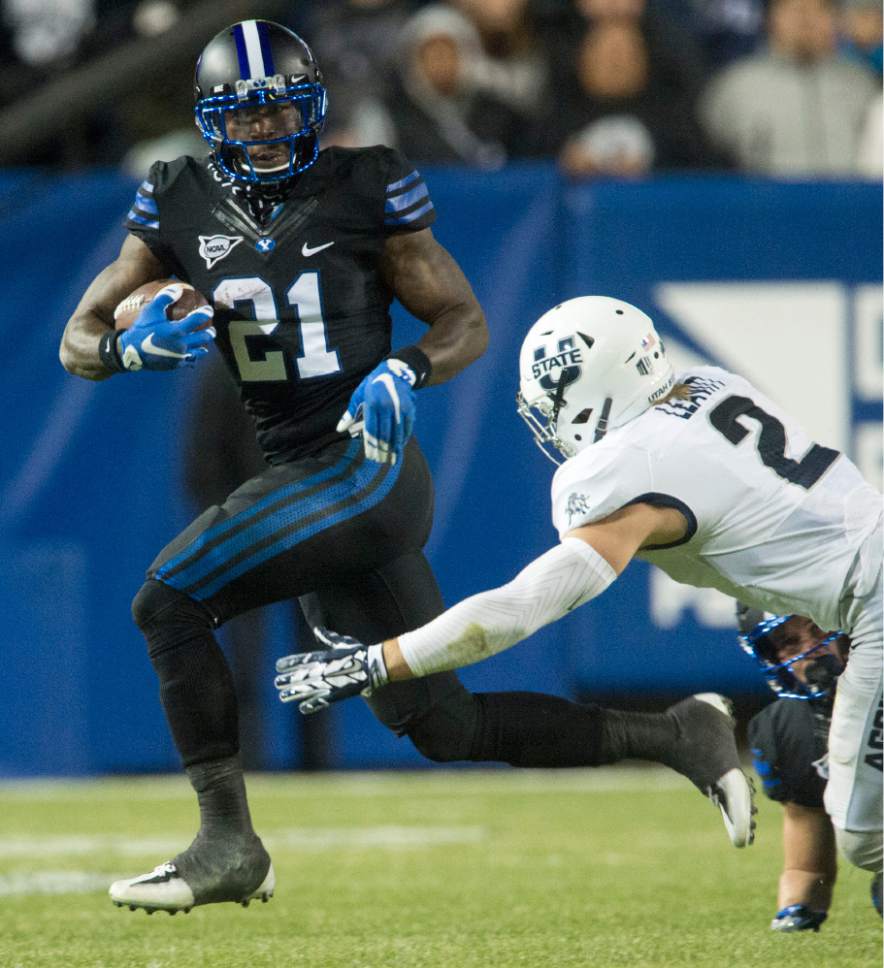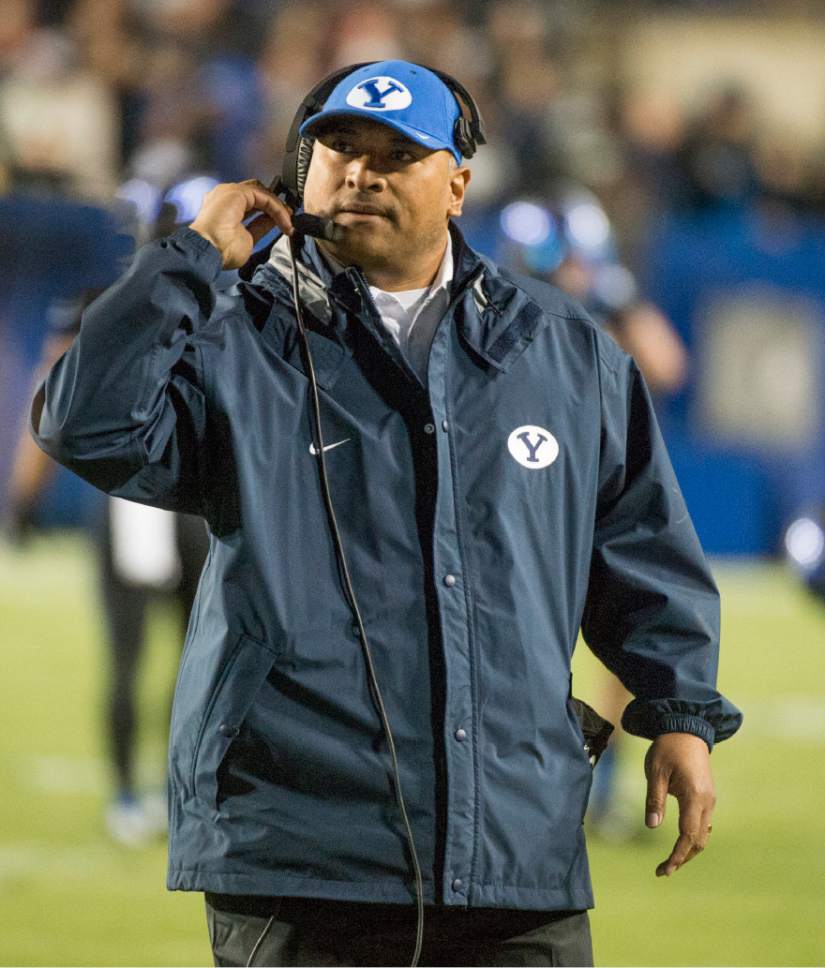This is an archived article that was published on sltrib.com in 2016, and information in the article may be outdated. It is provided only for personal research purposes and may not be reprinted.
In a weird way, the Utah Utes did themselves a favor by losing to Colorado. Now they won't have to watch USC, a team they beat in September, play in Friday's Pac-12 championship game.
That's the only consolation for Utah's November fade. And the win over USC also gives Utah's 8-4 season just enough of a distinction over BYU's 8-4 record — along with the Utes' 20-19 defeat of the Cougars, thanks to stopping BYU quarterback Taysom Hill's two-point conversion attempt.
Utah could have sent USC to the title game by beating Colorado, but the Buffaloes' 27-22 victory left the Trojans disappointed Saturday. They're not the only people upset with Utah's recent performance.
So I'm grading the Utes' 2016 performance as slightly better, while saying BYU's season was more satisfying for the Cougars.
That's mainly because expectations were lower for BYU going into the season, and the Utes' rise to No. 12 in the College Football Playoff standings two weeks ago created possibilities that they couldn't fulfill. Basically, Utah's November duplicated BYU's September, giving the Utes' season a less favorable feeling in the end. The Utes closed the regular season with losses to Oregon and Colorado, falling to 5-4 in conference play — the Pac-12's sixth-best record overall.
And that's also why BYU offensive coordinator Ty Detmer is getting decent reviews for his first season and Utah play-caller Aaron Roderick is being judged more harshly. The Ute offense's lasting impression is not good, with a total of four touchdowns and three field goals against Oregon and Colorado.
Picking apart the schedules and analyzing the statistics creates a remarkably similar profile of these teams, though. That's not terribly surprising, considering how the rivalry game played out at Rice-Eccles Stadium in September.
ESPN's College Football Index lists BYU No. 32 and Utah No. 33 overall, and its efficiency rankings are just as close. BYU is No. 4 in special teams, No. 25 defensively and No. 63 offensively. Utah is No. 3 in special teams, 27th defensively and 64th offensively. The index gives Utah an adjusted record of 9.5-3.5, while BYU's adjusted mark is 8.4-3.6, factoring in strength of schedule.
Here's my breakdown:
Impressive victories
Actually, there are not that many of them for either team. USC is by far the best opponent that lost to BYU or Utah, with Ute quarterback Troy Williams leading three touchdown drives in the second half of a 31-27 victory after USC led 24-10. That game marked USC quarterback Sam Darnold's first start, but the Utes get full credit for the win, because Darnold performed about as well in that game as in any other.
Utah won that game without Joe Williams, who has rushed for 1,113 yards in six games since coming back retirement (the Utes went only 3-3 in those games, however).
BYU beat three Power 5 opponents (Arizona, Michigan State and Mississippi State), but those teams went a combined 5-21 conference play. Aside from USC, the four teams Utah beat in the Pac-12 (Arizona, Oregon State, UCLA and Arizona State) went 8-24 in their other conference games. Edge: Utah.
Close losses
BYU will remember four losses by a total of eight points to teams such as Utah, West Virginia and Boise State. That ignores how the Cougars needed late drives to beat Arizona and Toledo, while they merely succeeded in cutting UCLA's lead to three points with a late touchdown. And the Bruins crumbled after that, going 2-7 in the Pac-12. Utah lost four games by a total of 19 points. Losses to California and Oregon will haunt the Utes, but they deserve credit for coming within 12 combined points of the Pac-12 finalists, Washington and Colorado. Each team went 8-1 in conference play. Edge: Utah.
Quarterback play
Hill and Williams had their moments this season, notably rallying their teams in September. In a sense, the way their offenses performed at the end of games was as much of an indictment as a compliment. That was especially true of the Utes in November, as the offense produced touchdown drives on its last possessions of frustrating losses to Oregon and Colorado.
Hill never became an efficient passer in his five-year BYU career, but his running was vital in the second halves of several victories. He stayed healthy for nearly the full schedule, before hyper-extending his elbow in the second half Saturday vs. Utah State. Hill is No. 55 in ESPN's Total QBR calculations.
Williams is No. 76 on that list. He was exposed Saturday by the Pac-12's best pass defense, completing 13 of 40 passes for 160 yards. Utah scored 21 offensive points against Oregon and 15 against Colorado. Edge: BYU.
Traditional statistics
Playing in the Pac-12 slightly skews Utah's statistics. In terms of yardage, the Utes' offensive (No. 58th) and defensive (tied for 49th) performances are closer than you might think. BYU is 34th in total defense and 70th in total offense. Edge: Even.
Twitter: @tribkurt







